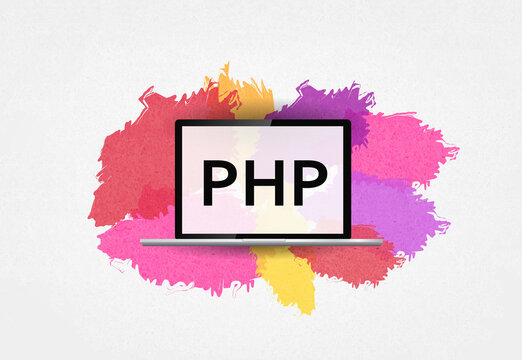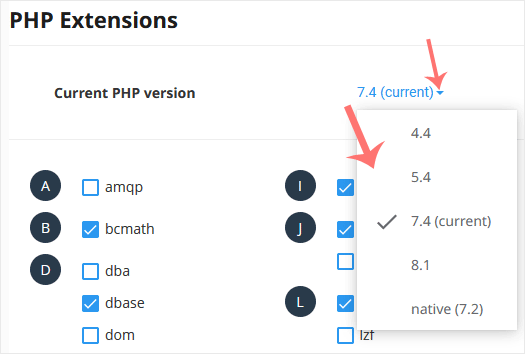What is PHP?

PHP stands for “Hypertext Preprocessor.” It is a widely used server-side scripting language that is especially suited for web development and can be embedded into HTML. PHP is commonly used to create dynamic web pages, interact with databases, handle forms, manage sessions, and perform various other tasks on the server side of web development.
PHP code is executed on the server, generating HTML which is then sent to the client’s web browser, where it is rendered and displayed to the user. PHP can work with various web servers and operating systems, making it a versatile choice for web development.
PHP is open-source and has a large community of developers contributing to its ongoing development and improvement. It is a popular choice for building websites and web applications due to its ease of use, flexibility, and extensive documentation.
What Happens When You Use an Old PHP Version?
Using an old version of PHP can have several implications, including:
- Security Risks: Older versions of PHP may have security vulnerabilities that have been discovered and patched in newer versions. Using an outdated PHP version can expose your website or application to potential security threats, such as unauthorized access, data breaches, and malware injections.
- Lack of Support: Older PHP versions may no longer be supported by the PHP development community. This means that they won’t receive updates, bug fixes, or security patches, leaving your website or application vulnerable to issues that arise over time.
- Compatibility Issues: Newer web technologies, frameworks, and libraries may not be compatible with older versions of PHP. Using an outdated PHP version could limit your ability to take advantage of the latest features and advancements in web development.
- Performance Limitations: Older PHP versions may lack performance optimizations and improvements that have been introduced in newer releases. This could result in slower execution times and decreased overall performance for your website or application.
- Compliance Concerns: Depending on your industry or region, using outdated software versions may lead to compliance issues with regulatory standards or best practices. Staying up-to-date with PHP versions can help ensure that your website or application meets relevant compliance requirements.
If you are using a PHP version that is not being supported, you are:
- Vulnerable to Security Risks: Unsupported PHP versions do not receive security updates or patches, leaving your website or application susceptible to exploitation of known vulnerabilities by attackers.
- Prone to Compatibility Issues: Unsupported PHP versions may not be compatible with newer web technologies, frameworks, and libraries, hindering your ability to leverage the latest features and advancements in web development.
- Potentially Non-compliant: Depending on your industry or region, using unsupported software versions may lead to non-compliance with regulatory standards or best practices, exposing you to legal and reputational risks.
- Limited in Support Options: Without official support from the PHP development community, you may struggle to find assistance or guidance in resolving issues or optimizing your codebase.
Why Should You Update PHP?
PHP is the backbone of your website and you should go for the updated version to ensure its optimum performance. A word of caution here: Before you decide to upgrade, check the compatibility of your site against new versions of PHP. Read on to know more about “how to update PHP version in WordPress” and the benefits that come with it.
Here are some benefits of updating PHP
- Security Enhancements: Each new PHP version typically includes security patches and fixes for vulnerabilities discovered in previous versions. By updating PHP, you ensure that your website or application is protected against known security threats, reducing the risk of unauthorized access, data breaches, and malware infections.
- Performance Improvements: Newer PHP versions often come with performance optimizations and enhancements, resulting in faster execution times and improved resource utilization. Updating PHP can lead to better overall performance for your website or application, providing a smoother and more responsive user experience.
- Compatibility with Latest Technologies: Updating PHP ensures compatibility with the latest web technologies, frameworks, and libraries. This allows you to take advantage of new features, functionalities, and development tools, as well as ensuring that your website or application remains compatible with modern web browsers and server environments.
- Support and Community Resources: Using a supported PHP version means that you have access to ongoing support, documentation, and community resources. This can be invaluable for troubleshooting issues, finding solutions to problems, and staying informed about best practices and updates in the PHP ecosystem.
- Compliance with Standards: Many compliance frameworks and standards require the use of supported software versions to mitigate security risks and ensure data protection. Updating PHP helps ensure compliance with regulatory standards, industry best practices, and security requirements, reducing the risk of legal and reputational consequences.
- Long-term Viability and Sustainability: By keeping your PHP environment updated, you ensure the long-term viability and sustainability of your website or application. Unsupported PHP versions may become obsolete over time, making it increasingly difficult to maintain and secure your software infrastructure. Updating PHP helps future-proof your development environment and ensures that you can continue to deliver value to your users over time.
Steps to Change PHP Version
Log in to your cPanel account.

Navigate to the Software section and click on Select PHP Version. Software > Select PHP Version.

Click on the PHP Version drop-down box and select your preferred PHP version.
Click on Set as current button to save your PHP version change.
